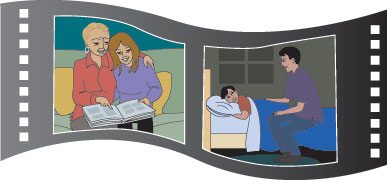|
How You Can Help Your Parent
Help With Care
Help by Being Thoughtful
Help by Staying Involved
"Some days I felt really good
about the little things I could
do for my mom. Other times
there wasn't anything I could
do except just be with her.
We didn't always have to
talk. Even when I was quiet,
I think my mom could sense
my love."
- Vanessa, age 16
Here are some things that others have done to help their parent
at home. Pick one or two things to try each week.
Spend time with
your parent.
Watch a movie together.
Read the paper to your
parent. Ask for help
with your homework.
Give hugs. Say,
"I love you."
Or just hang out
in silence.
Lend a hand.
Bring water or
offer to make a snack
or small meal.

Try to be upbeat, but be "real," too.
Being positive can be good for you and your whole family. But
don't feel like you always have to act cheerful, especially if it's
not how you really feel. It's okay to share your thoughts with
your parent--and let them comfort you. Be yourself.
Be patient.
You are all under stress. If you find you are losing your cool, listen
to music, read, or go outside to shoot hoops or go for a run.
Share a laugh.
You've probably heard that laughter is good medicine. Watch a
comedy on TV with your parent or tell jokes if that is your thing.
Also, remember that you're not responsible for making everyone
happy. You can only do so much.
Buy your parent a new scarf or hat.
Your parent might enjoy a new hat or scarf if he or she has lost
their hair during treatment.

Keep your parent in the loop.
Tell your parent what you did today. Try to share what is going on
in your life. Ask your parent how his or her day was.
Talk about family history.
Ask your parent about the past. Talk about what you're both most
proud of, your best memories, and how you both have met
challenges. Tape record, write, or draw these things. Ask to see
old letters or photo albums.
Keep a journal together.
Write thoughts or poems, draw, or put photos in a notebook that
the two of you share. This can help you share your feelings when
it might be hard to speak them aloud.
Help with younger brothers and sisters.
Play with your brothers and sisters to give your parent a break.
Pull out games or read a book with your siblings. This will help
you stay close and also give your parent time to rest.

"Before my dad got cancer, I didn't take
time to really notice all the stuff I had
going for me. But I've learned to open
my eyes more. Bad things happen in
this world--like my dad getting cancer--
but it's a pretty wonderful place, too.
Even while there's been a lot of added
pressure on our family, I've learned to
appreciate every day more."
- Kenyatta, age 18

Back to Top
< Previous Section | Next Section > |